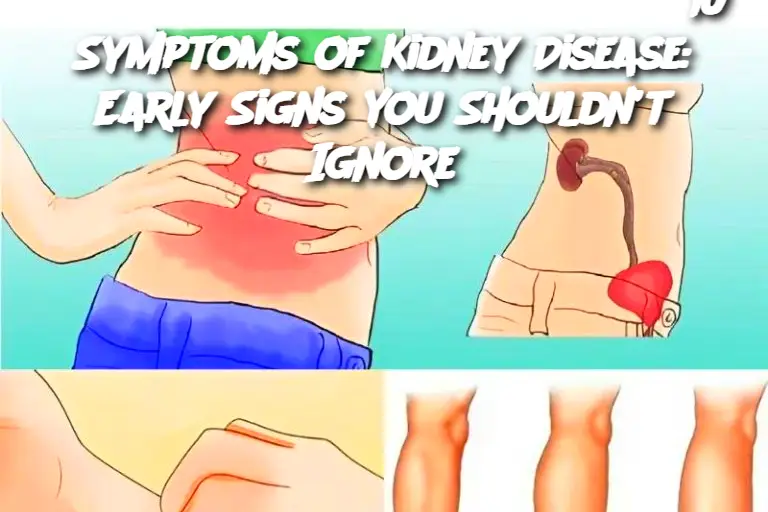ADVERTISEMENT
Introduction:
Kidney disease is a common yet often overlooked condition that can lead to severe complications if left untreated. The kidneys are responsible for filtering toxins from the blood, regulating blood pressure, and maintaining overall fluid balance. Kidney disease, also known as renal disease, can develop silently, making it crucial to recognize the early signs. In this article, we explore 10 symptoms of kidney disease that you should be aware of to help detect the condition early and seek timely medical intervention.
Symptoms of Kidney Disease
Fatigue or Weakness:
One of the first signs of kidney disease is feeling unusually tired or weak. This happens because the kidneys are unable to remove toxins and waste products from the blood efficiently, which can lead to anemia and low energy levels.
Swelling in the Legs, Ankles, or Feet:
When the kidneys cannot excrete enough fluid, it can build up in the body, causing swelling (edema) in the lower parts of the body, especially the legs, ankles, and feet.
Frequent Urination, Especially at Night (Nocturia):
An increase in urination, particularly during the night, can be a sign of kidney issues. The kidneys might not be able to concentrate urine properly, leading to frequent trips to the bathroom.
Changes in Urine Color or Appearance:
Dark, bloody, or foamy urine may signal kidney problems. Blood in the urine (hematuria) can indicate an infection or damage to the kidneys, while foamy urine might be a sign of protein in the urine.
Pain or Pressure in the Back or Sides:
If you experience persistent pain or pressure around your back or sides, just below the ribs, it might indicate kidney inflammation or infection.
Shortness of Breath:
Fluid accumulation in the lungs due to kidney dysfunction can lead to difficulty breathing or shortness of breath. This symptom may worsen when lying down.
Nausea or Vomiting:
As toxins build up in the bloodstream, the body may react with nausea or vomiting. This can also lead to a decreased appetite and unintentional weight loss.
Persistent Itchy Skin:
When the kidneys are not functioning properly, the buildup of waste in the body can lead to dry, itchy skin. This is a common symptom that might be mistaken for other skin conditions.
High Blood Pressure (Hypertension):
The kidneys help regulate blood pressure by controlling the balance of fluids and salt in the body. Kidney disease can cause blood pressure to rise, which in turn can further damage the kidneys.
Difficulty Sleeping:
As kidney disease progresses, it can interfere with sleep due to discomfort, nocturia, or fluid buildup. This, combined with fatigue, can significantly impact quality of life.
Preparation:
If you experience any of these symptoms, it's essential to seek medical advice as early diagnosis can help manage kidney disease effectively. A healthcare provider may recommend urine tests, blood tests, imaging tests, or a biopsy to confirm the diagnosis.
Serving and Storage Tips:
While kidney disease may not be directly related to a specific diet, those diagnosed with the condition often need to adjust their diet to reduce strain on the kidneys. Patients may be advised to limit protein intake, reduce salt consumption, and avoid high-potassium or high-phosphorus foods.
Variants:
ADVERTISEMENT
